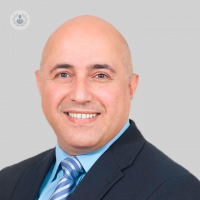What is erectile dysfunction?
Escrito por:Erectile dysfunction is when a man is unable to attain or sustain an erection that is sufficient for satisfactory penetrative sexual intercourse. This can greatly impair a man’s quality of life.
Leading consultant urologist, Mr Aza Mohammed, is here to walk us through erectile dysfunction and how it can be treated.

Can erectile dysfunction happen at any age?
Depending on the cause of erectile dysfunction, it can present itself at any age. However, it is not very common before the age of 40.
What causes erectile dysfunction?
An erection requires an intact blood supply and nerves travelling through the tissues of the penis. A man’s emotions and state of mind also have a role to play. Anxiety and stress can impede a successful erection.
Therefore, the causes of erectile dysfunction can be divided into psychogenic and organic causes (vascular or neurogenic causes):
- Psychogenic causes include anxiety, stress or a lack of intimacy with your partner.
- Vascular causes include ischaemic heart disease, hypertension and obesity.
- Neurogenic causes include diabetes mellitus, stroke and spinal cord injury.
Other causes of erectile dysfunction can include drugs such as antihypertensive medicines, antidepressants and recreational drugs including alcohol. Anatomical penile disorders such as very tight foreskin, Peyronie’s disease and priapism can also cause erectile dysfunction.
Can the stress of erectile dysfunction make it worse?
For an erection to happen, there is a cascade of chemical substances that are produced in the brain, and locally, in the tissues of the penis that result in the erection. Stress can result in the alteration of this process and can disrupt the production of these signals. Furthermore, stress can affect the man’s ability to relax and it increases the production of certain chemicals in the body, such as adrenaline, which can inhibit the process of an erection.
If erectile dysfunction is caused by certain medications, can it be reversed when the patient stops taking them?
There are a number of medications that can cause erectile dysfunction. The main ones include anti-hypertensive (beta-blockers and thiazides) medication, antidepressants and recreational drugs (such as alcohol, marijuana and cocaine). It is essential that a full review of medications is conducted by the doctor to exclude any potential risk factor.
How can erectile dysfunction be treated?
Erectile dysfunction is treated in a stepwise fashion. The most important step is to eliminate any risk factors and to maintain a healthy lifestyle. In instances where psychogenic erectile dysfunction is suspected, referral for sexual counselling is recommended.
The three steps in managing erectile dysfunction are as follows:
Step one: medicines (phosphodiesterase 5 inhibitors). This is a class of drugs including Viagra that results in relaxation of the tissues in the penis and will result in an erection. It is important to note that these medicines augment rather than create erections, and sexual stimulation is an essential part of using these medicines. These medicines should not be used in men with some heart conditions and it is always advised that you consult your doctor prior to their use.
Step two: penile injection or pump. This is used when medication fails. There can be associated risks and some side effects such as bleeding. The initial training on how to administer this treatment should only be performed by a qualified clinician.
Step three: insertion of a penile prosthesis. This is considered to be the last option in refractory cases. It is a major operation and can only be performed in specialised centres.
If you’d like more information regarding erectile dysfunction, don't hesitate to book a consultation with Mr Aza Mohammed via his Top Doctors profile today.


